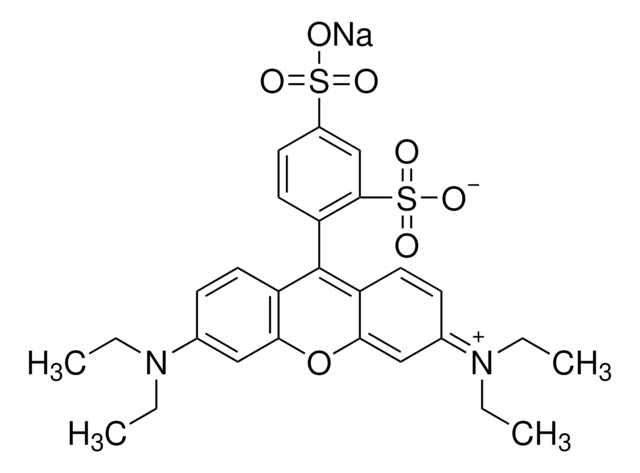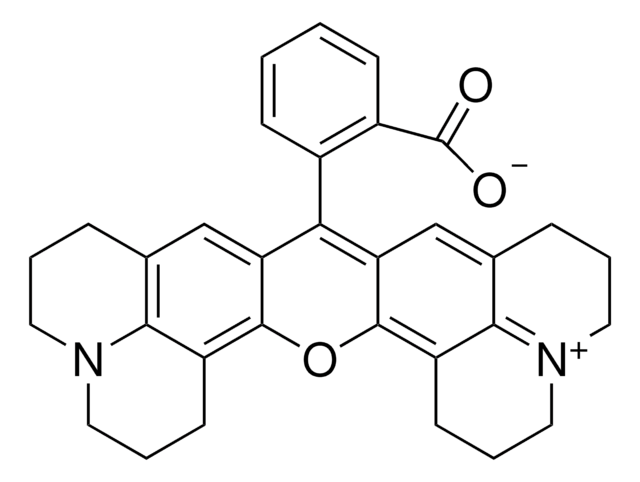S7635
Sulforhodamine 101
Dye content ~95 %, Powder
Synonym(s):
SR101; 2-(3-oxa-23-aza-9-azoniaheptacyclo[17.7.1.15,9.02,17.04,15.023,27.013,28]octacosa-1(27),2(17),4,9(28),13,15,18-heptaen-16-yl)-5-sulfobenzenesulfonate
About This Item
Recommended Products
product name
Sulforhodamine 101, Dye content ~95 %
form
powder
Quality Level
composition
Dye content, ~95%
technique(s)
microbe id | staining: suitable
color
black
dark green to brown
solubility
methanol: 1 mg/mL
ε (extinction coefficient)
≥105000 at 573-579 nm in ethanol
fluorescence
λex 586 nm; λem 605 nm in H2O
application(s)
diagnostic assay manufacturing
hematology
histology
storage temp.
room temp
SMILES string
OS(=O)(=O)c1ccc(C2=C3C=C4CCC[N+]5=C4C(CCC5)=C3Oc6c7CCCN8CCCc(cc26)c78)c(c1)S([O-])(=O)=O
InChI
1S/C31H30N2O7S2/c34-41(35,36)20-9-10-21(26(17-20)42(37,38)39)27-24-15-18-5-1-11-32-13-3-7-22(28(18)32)30(24)40-31-23-8-4-14-33-12-2-6-19(29(23)33)16-25(27)31/h9-10,15-17H,1-8,11-14H2,(H-,34,35,36,37,38,39)
InChI key
COIVODZMVVUETJ-UHFFFAOYSA-N
Looking for similar products? Visit Product Comparison Guide
General description
Application
- to label astrocytes
- in quantitative polymerase chain reaction (PCR)
- to determine the degree of disintegration in tissue sample
Biochem/physiol Actions
Storage Class
11 - Combustible Solids
wgk_germany
WGK 3
flash_point_f
Not applicable
flash_point_c
Not applicable
ppe
Eyeshields, Gloves, type N95 (US)
Certificates of Analysis (COA)
Search for Certificates of Analysis (COA) by entering the products Lot/Batch Number. Lot and Batch Numbers can be found on a product’s label following the words ‘Lot’ or ‘Batch’.
Already Own This Product?
Find documentation for the products that you have recently purchased in the Document Library.
Our team of scientists has experience in all areas of research including Life Science, Material Science, Chemical Synthesis, Chromatography, Analytical and many others.
Contact Technical Service




